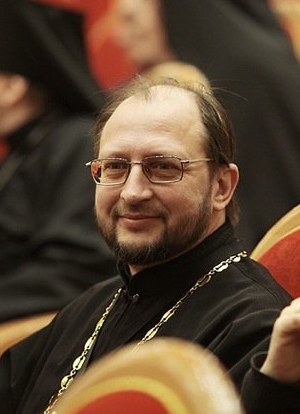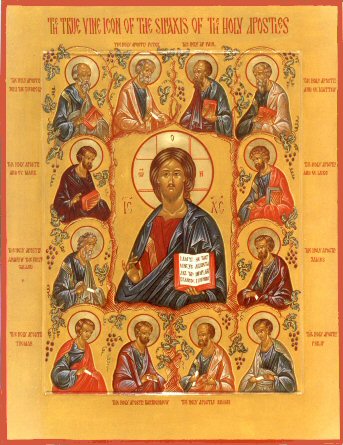Source: pravmir.com
By Archpriest Igor Pchelintsev

|
Now we should start fasting for a little while… We’ve had our big bash during the week of Pentecost and eaten plenty of non-fasting foods. Now it’s time to fast. For us it’s “business as usual.” We should follow the rules: receive Communion, go to Confession… But for some people this fast doesn’t exist. They say: “This isn’t Great Lent. We don’t have the time (or the strength or energy) to fast ‘all the time.’”
I think it would be quite reasonable to devote this fast to a consideration of apostleship in the Church – even to an active consideration.
Please do not misunderstand me. Taking the title of “apostle” upon oneself without a blessing would be too audacious; very few saints in the Menologion are called “equal-to-the-apostles.” Nevertheless, every Christian should be a minister of the Word of God. The words spoken by Christ to the Apostles at His Ascension define the basic apostolic mission: Go ye therefore, and teach all nations, baptizing them in the name of the Father, and of the Son, and of the Holy Spirit: Teaching them to observe all things whatsoever I have commanded you: and, lo, I am with you always, even unto the end of the world. Amen (Matthew 28:19-20).
God sent the Holy Spirit to the Apostles so that they would carry the message of the Resurrection to all the ends of the earth. Through the Apostles, this task was instituted within the church hierarchy, among bishops and priests. A bishop or priest who lives in Christ (or is at least trying to) can sincerely repeat with the Apostle: For though I preach the gospel, I have nothing to glory of: for necessity is laid upon me; yea, woe is unto me, if I preach not the gospel! (1 Corinthians 9:16). But this does not relieve the laity of their obligation to evangelize. This is especially true for Orthodox Christians. It would be very good for us to test our strength in this during the fast that the Church has named after the Apostles.
I’d distinguish two basic directions in this task: inward apostleship and outward apostleship. (Please don’t judge this terminology harshly; if you detect a “shade of Protestantism” here, I can find other words.)
Inward apostleship is probably the most important for the majority of people, either those who are already in the Church or those who are still looking for their way and place in it. One should bear the Good News – of the Resurrection of Christ, of repentance, and of the transfiguration of the human person by the Holy Spirit – first of all to one’s own heart and mind. To accept, inwardly and humbly, that which the Church gives to those who are seeking God. To learn simple things (that seem simple at first sight and really are uncomplicated): simply to believe, to trust in God and His Word, to have faith in the Church as one’s mother, and to pray simply – as I tell my students, “without hand-wringing and eye-rolling.” (Figuratively, of course: I mean, praying in a sensible manner and without straining your nerves.)
 |
There’s a beautiful expression: “Fasting and prayer are the two wings lifting the Christian to the Heavenly Kingdom.” If that’s the case, and if prayer should be simple and sensible, then our fasting should also be simple and sensible. (We talked about this during Great Lent.) Let us forgo a label-reading-molecular-biological approach and fast according to our strength. We should fast for Christ and for the transfiguration of our decayed (or decaying) natures by the Spirit of God.
Our inner conviction in the rightness of God’s Word, along with repentance and life in the Church, should give us the most creative foundation for apostleship there is: peace of heart and an attitude towards God, the Church, people, and ourselves that is different from that of the vain world. Peace, love, forgiveness, compassion, empathy, and pain of heart over falsehood and injustice – these qualities of the Christian soul are the opposite of indifference and hatred.
We should allow God to graft these good things onto our branches, to allow Him to join us to Him. He is the vine and we are the branches. We can do nothing without Him. Everything finds its value in God, including evangelization. This is the most appropriate way to observe the fast.
Outward apostleship is also very important, inasmuch as we Christians are also responsible for others: for these near and far, for the whole world. Even when it seems that we do not have enough strength of soul for ourselves, not to mention for the entire world!
No single person could ever acquire the strength to save the world. One can only work with God, helping Him in the fulfillment of His will in the world: that all would come to the knowledge of truth and be saved. But exhort one another daily… lest any of you be hardened through the deceitfulness of sin (Hebrews 3:13).
In this age of the “wild market” and obtrusive advertising, we have learned to distrust anyone who promises us something good. In such a context, a word such as “evangelization” can frighten people. Due to our spiritual timidity, we’re afraid to offer our faith to others, because we don’t want to treat it like a commodity. We respect the people around us and don’t want them to think that we’re trying to impose our views on them or that we’re trying to “convince someone 100% of the most right and proper thing.” This is especially the case when we’re talking about something as personal as having trust in God.
For Christians, proclaiming the Good News of the Resurrection does not mean talking about doctrine or memorizing a set of paragraphs or talking points. Evangelization means, above all else, witnessing to the inward transfiguration of human nature. The Lord Jesus Christ returned value and dignity to every person with infinite respect. Evangelization doesn’t mean simply talking with someone about Jesus or Orthodoxy as such. On a more profound level, it means making someone understand how precious he is to God. That is how the Holy Fathers and many ascetic strugglers, who understood the action of the Holy Spirit in the human person, spoke about it.
Our outward witnessing to Christ and the Church can arise only as the result of our inward apostleship and the assimilation of the life in Christ through legitimate ecclesiastical means: fasting, prayer, almsgiving, and the Mysteries (as already mentioned many times!). Otherwise our words will lack spiritual power; they will be meaningless even to ourselves.
I recently came across some radiant Christian reflections that I thought would be quite appropriate for our conversation about every Christian’s inward and outward apostleship. Therefore, instead of the usual examples, I’d like to conclude my remarks about St. Peter’s Fast with these words, which are full of Christ’s love:
1. People are often unreasonable, irrational, and self-centered. Forgive them anyway.
2. If you are kind, people may accuse you of selfish, ulterior motives. Be kind anyway.
3. If you are successful, you will win some unfaithful friends and some genuine enemies. Succeed anyway.
4. If you are honest and sincere people may deceive you. Be honest and sincere anyway.
5. What you spend years creating, others could destroy overnight. Create anyway.
6. If you find serenity and happiness, some may be jealous. Be happy anyway.
7. The good you do today will often be forgotten. Do good anyway.
8. Give the best you have, and it will never be enough. Give your best anyway. In the final analysis, it is between you and God. It was never between you and them anyway.
9. No matter who says what about you, accept it all with a smile and continue doing your own work.
10. Pray together and abide in unity.

